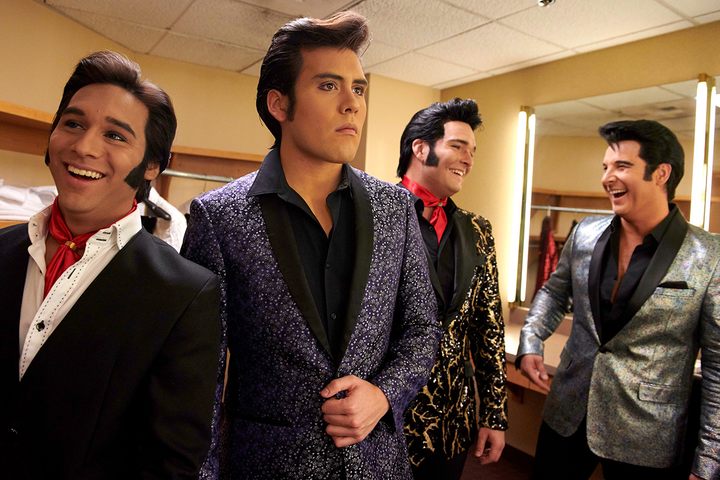
The Mississippi Town Where Elvis Tribute Artists Are Made
Tupelo, birthplace of The King, is the global hub for aspiring Jailhouse Rockers.
In 1946, an 11-year-old boy and his mother walked into Tupelo Hardware Company, on the corner of Main and Front streets in Tupelo, Mississippi. They were looking for a gift for the boy’s birthday. He really wanted a shotgun, but his mother refused. A store employee, at the front counter noticed the youngster’s disappointment and handed him a guitar to try. After strumming it several times, the boy acquiesced. Mother and son soon departed with his very first guitar in hand. Today, a black “X” marks the spot where that iconic purchase took place. According to current Tupelo Hardware Company employee Connie Tullos, or Ms. Connie as she’s better known, this is where Elvis the musician was born.
For nearly nine years, Tullos, 73, has worked the counter at Tupelo Hardware Company. It’s a dream job for Tullos, who is also the vice president of the Tupelo Elvis Fan Club and has been listening to his music since she was a teen. “I remember the first time that I heard his music thinking, Oh my goodness what is this?” she says.
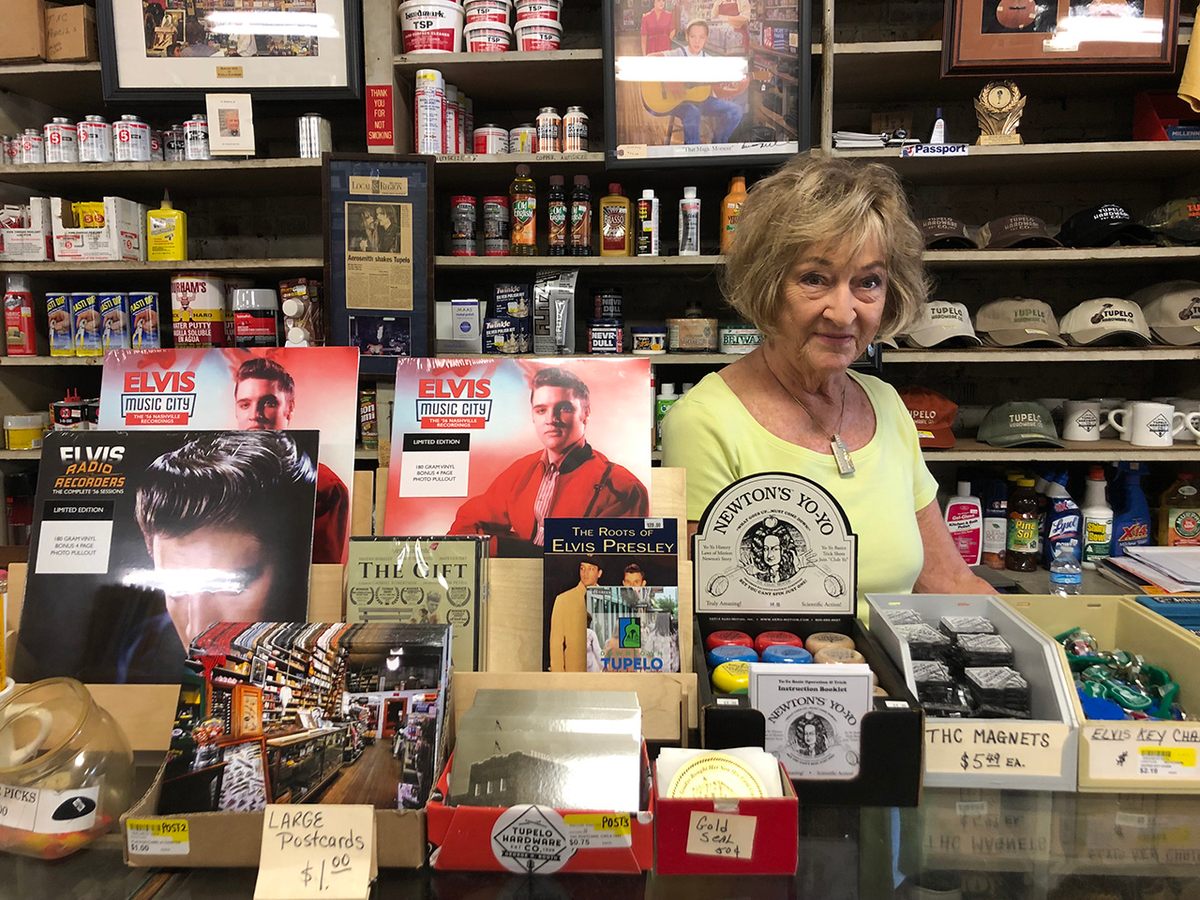
While much more associated with Memphis, Tennessee—a less than two-hour drive northeast of the city—Elvis Aaron Presley was born and spent the first 13 years of his life in Tupelo, Mississippi. Today, the city is home to the Ultimate Elvis Tribute Artist Competition: one of more than a dozen tribute artist contests taking place around the globe. These competitions act as pre-qualifiers for August’s Ultimate Elvis Tribute Artist Contest at Graceland. Run by Elvis Presley Enterprises every year since 2007, it’s the cream of the crop for Elvis tribute artists (ETAs).
Remnants of Elvis’ childhood are everywhere in Tupelo. There’s Johnnie’s Drive-In, a small mid-century diner where Elvis and his parents would eat burgers and sip RC Colas. You can still catch a show at the Lyric Theatre, a former movie house where Elvis would often come to watch Westerns, and enter the Assembly of God church where Presley’s parents, Gladys and Vernon Presley, first met. Today the church is part of the larger Elvis Presley Birthplace, a historic site with an Elvis museum and the two-room, shotgun-style house in which the King himself was born. Tupelo’s Fairpark District, a former fairground where Elvis performed his 1956 homecoming concert, is the location for the Tribute Artist Competition.
“There’s a difference between tribute artists and impersonators,” says Debbie Brangenberg, executive director of Downtown Tupelo Main Street, the association that puts on the larger Tupelo Elvis Festival, of which the competition is a part. “Impersonators choose to think they are Elvis, while a tribute artist does his very best to show a tribute to Elvis’s work, but when they are not on stage don’t pretend to be anybody but themselves.”
Each June in Tupelo, an average of 15-20 ETAs work their best snarled lips, swiveled hips, and wide range of vocals to channel Mr. Presley, from his early years rocking high-collared jackets and black-and-white striped shirts to the Peacock, Blue Swirl, and American Eagle jumpsuits of the 1970s. While the usual line-up is all-male, women are welcome to compete. The winner is guaranteed advancement to the Ultimate ETA Contest in Memphis, and gets an additional perk: enrollment in Elvis Boot Camp, an intensive two-day training, run by Downtown Tupelo Main Street, that’s specially designed for Tupelo winners. Not only does it prepare them for competing at Graceland but assures that, when they do, these representatives of Elvis’ birthplace shine.
COVID-19 forced organizers to hold the 2020 festival online, but Tupelo plans to welcome back competitors in 2021.
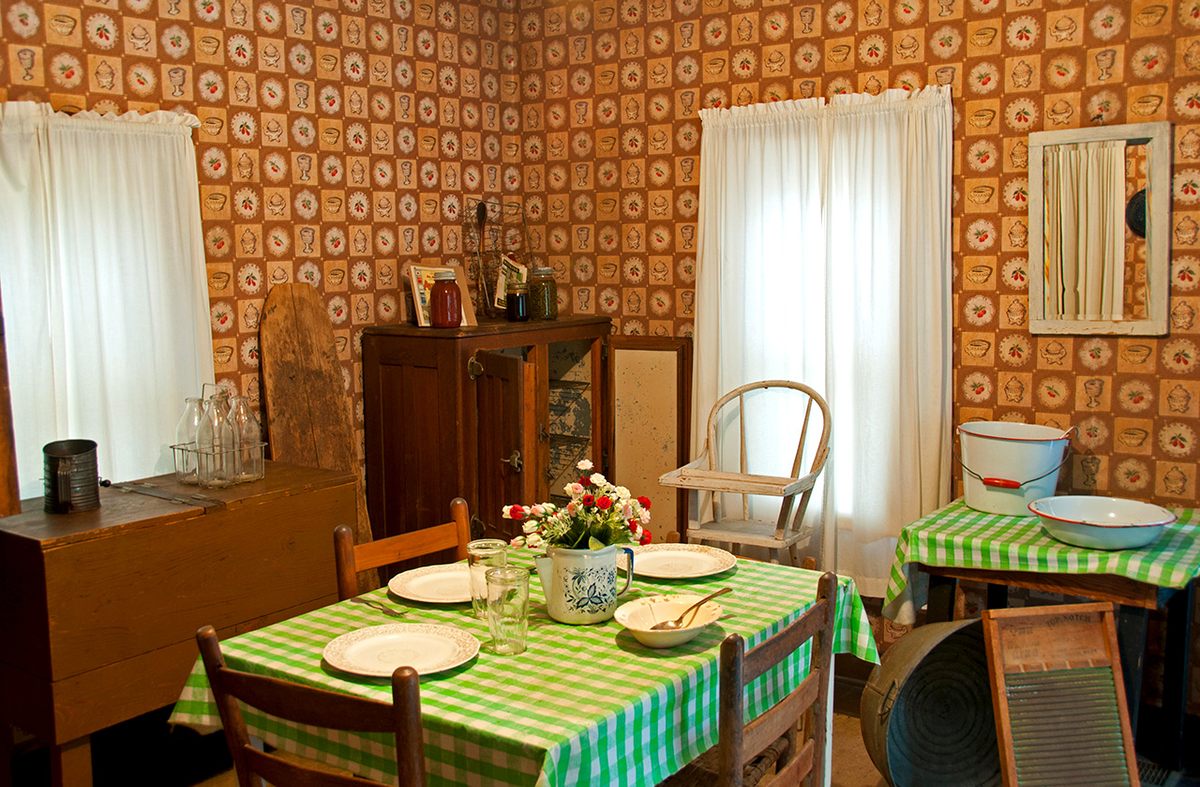
“As far we know, Tupelo is the only pre-qualifier that offers such a service,” Brangenberg says. “Nine of our 12 winners have either gone on to win the Ultimate in Memphis that same year, or a year or two after repping us. We like to think our boot camp helped.”
Elvis Boot Camp is held primarily at Downtown Tupelo Main Street’s office, with excursions to the community theatre and local church choir rooms to test stage makeup and vocals. “It’s not a scenario in which we try and change them at all,” says Brangenberg. “Rather, it’s to give them the best tools available for winning Memphis.” This includes working on things like posture, choosing the top songs for their vocal range (since their song selections must be submitted ahead of time), and how to handle the media. There’s a professional vocal coach on hand to help the ETA reach a particular note and perfect their pitch, as well as a makeup artist who can assist with their on-stage appearance. Many ETAs get their costumes from professional outfitters such as B&K Enterprises, which tailors authentic recreations of the King’s own wardrobe. Boot camp officials make sure the tailoring’s up to snuff and that each suit properly aligns with the ETA’s song selections. “Because if these things don’t match,” says Brangenberg, “Elvis fans know.”
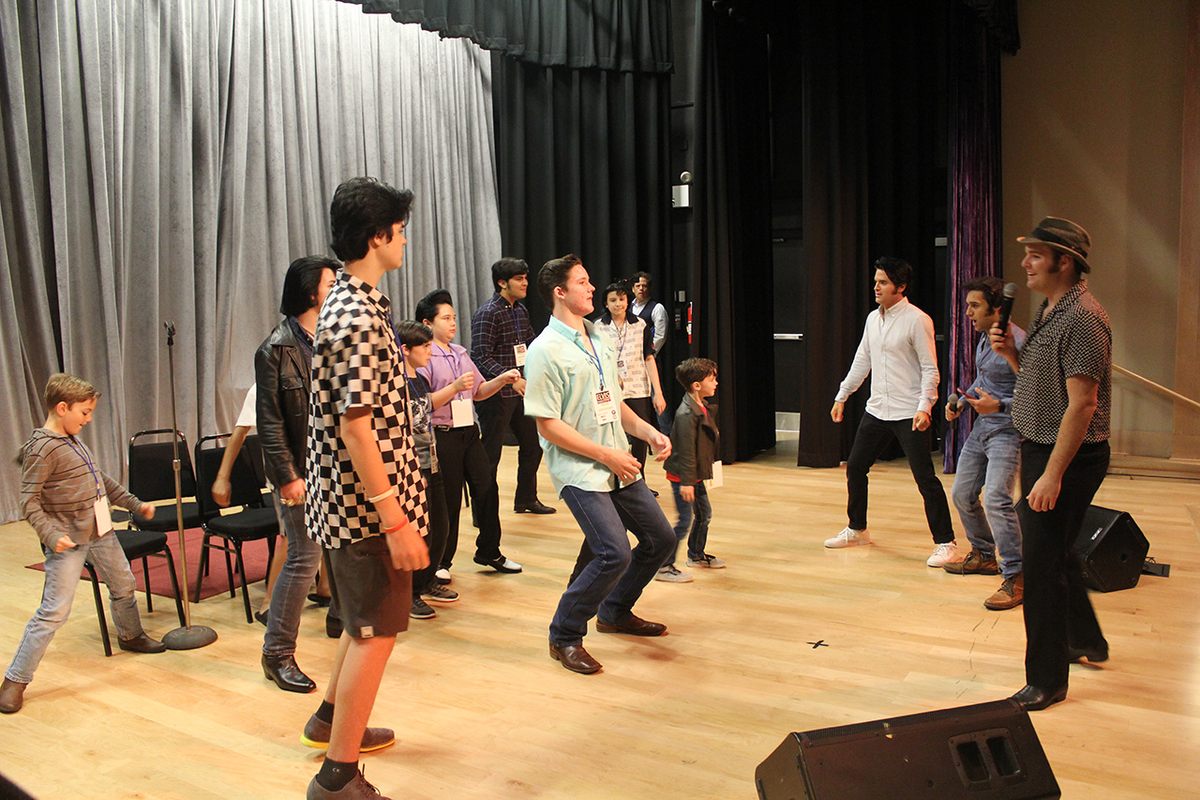
Then, of course, comes the hair. “We realize hair is a pretty private thing,” Brangenberg says, “and we don’t want to mess with what they already have going. However, depending on their need we do have two stylists in town who are trained to cut hair like Elvis wore his in different eras.” Some Tupelo winners prefer to leave their hair as is, while others wear wigs (which Tupelo’s stylists can trim, cut, and shape accordingly, she says) on stage. Dance moves are another thing Boot Camp officials tend to avoid. “It’s the kind of thing you can either do or you can’t,” says Brangenberg.
At the end of two days Tupelo’s Elvis-memorabilia-filled Silver Moon Club hosts a fan reception, at which the ETA performs for dozens of local guests. Sometimes he tries out a new vocal technique that he’s been practicing, or debuts a new costume or style. Then, he’s on his way to Memphis.
“Representing the birthplace of Elvis in Memphis is a big deal,” says Cote Deonath, Tupelo’s 2017 Ultimate ETA winner. “Not only is Elvis from Tupelo,” Deonath says, “but the city’s judges are some of the best around. These are people who knew Elvis and have a deep connection to him, so they’re really well-versed in what to look for.” Deonath also represented Tampa, Florida, in 2016; Branson, Missouri, in 2018; and Tweed, Ontario, in 2019—entrants can compete in any city and may travel to a location where they are more likely to win. He believes Tupelo is the most difficult pre-qualifying competition around. “In many ways,” he says, “winning in Tupelo was an even bigger honor than performing in Memphis.” Although Deonath’s long-standing relationship with the city may have something to do with this.
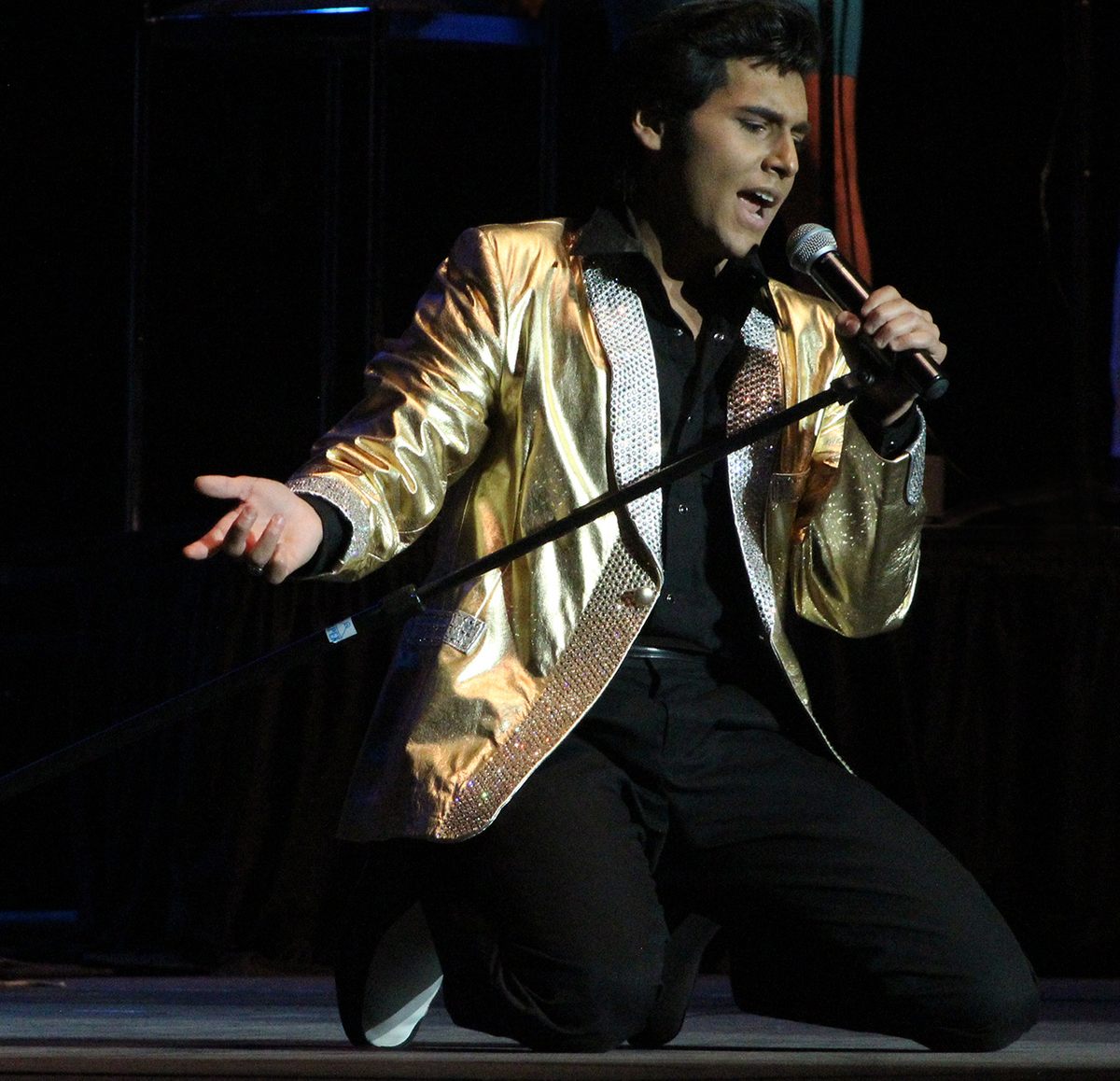
By age four, the 23-year-old Florida native was already practicing his signature moves on stage at his local Christian academy, wearing a little gold lamé outfit and garnering support from his grandmother, a die-hard Elvis fan and “my biggest cheerleader,” says Deonath. But it wasn’t until age 10 that he got to realize one of his childhood Elvis dreams. “It was always a goal for my parents to take me to Tupelo and Memphis, to see the house where he was born, Graceland…stuff like that,” he says. “So when Tupelo did an Elvis youth contest in 2007 they signed me up, and things just snowballed from there.”
Deonath won the role of “little Elvis” in the Tupelo Hardware Company’s living history reenactment, highlighting the day Elvis got his first guitar, and for several years performed in front of the Lyric Theatre as part of the larger Tupelo Elvis Festival. In 2016 he won second place at the city’s Ultimate Elvis Tribute Artist Competition, but it was a year later that he scored Tupelo’s grand prize. “It was between me and Matt King from England,” Deonath says, “and I just assumed I’d gotten second place again. But then, you know that feeling of when you’re going down a roller coaster and your stomach pops into your throat? That’s what I felt when they called my name as the winner. I just dropped to my knees, and then I thought, ‘Now I get to go to boot camp!’”.
For Deonath, the experience was nothing short of amazing. “You’ve got this entire team of people who’ve already worked with some of the best Elvis tribute artists in the world,” he says, “and they’re completely there for you, building your confidence and offering moral support, and basically saying, ‘You’ve made it. You’re just here for the ride now.’”
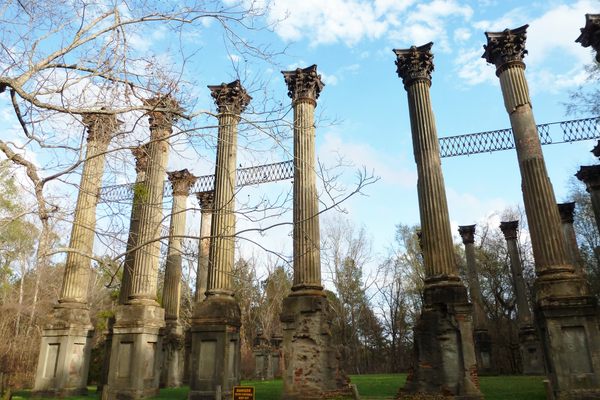

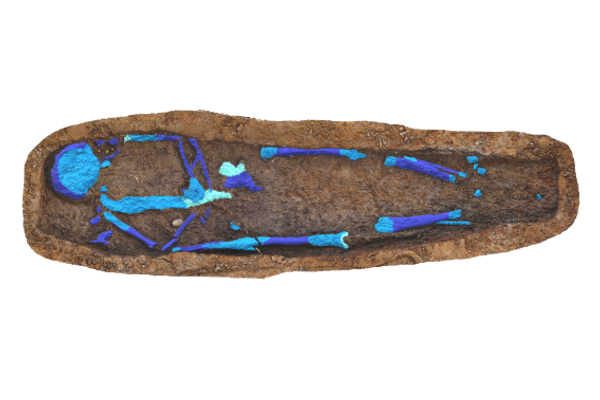





Follow us on Twitter to get the latest on the world's hidden wonders.
Like us on Facebook to get the latest on the world's hidden wonders.
Follow us on Twitter Like us on Facebook